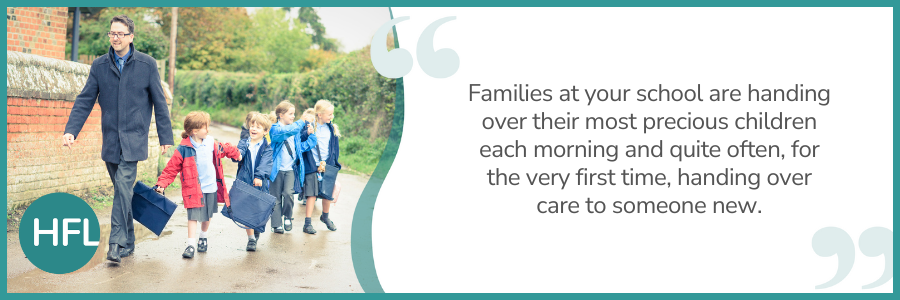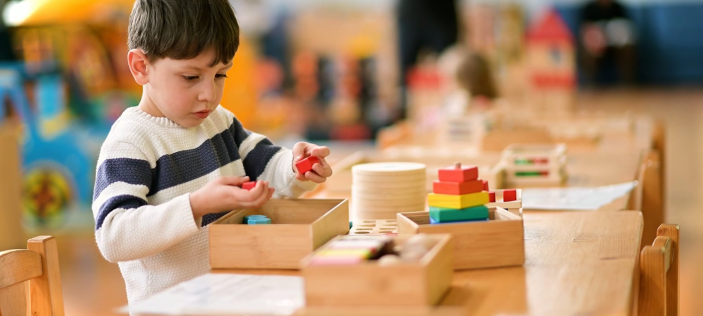
Whether you are new to teaching in the EYFS, or perhaps returning after some time away, I think we’d all agree that change can be daunting, especially as the education landscape in the UK moves so quickly. I think that we would also agree though, that working with the youngest children in our schools is an immense privilege and joy, and I hope that this short blog will equip you to feel a little more confident to start your new EYFS adventure.
Get to know your staff team, your school, and local EYFS networks
Whether you’re in a large three form entry primary school or a small infant school, you will want to get to know who everyone is and their role within the EYFS team you are joining. Working in the EYFS is very much a team effort, and amongst your team there is likely to be an EYFS Leader who has over-arching responsibility for the EYFS, qualified teachers in Nursery and Reception classes, early years practitioners, and possibly higher-level teaching assistants. In addition, it is likely that there will be additional staff who look after children at lunchtimes or those who might run interventions to support specific groups. All staff play a vital role, and spending time getting to know the team and their areas of expertise and responsibility will be time well spent. If you are new to your school as well as the EYFS, spend some time orientating yourself, meeting key staff members and finding out where those all-important resources are stored! Sometimes it can feel a little isolating working in the EYFS, and so it is vital that you find out what networks are available locally, perhaps with schools in your area or your district. There are a wealth of online forums and EYFS social media communities, which might also be useful, though these come with a health warning; don’t fall into the comparison trap!
Get to know your children and their families
Families at your school are handing over their most precious children each morning and quite often, for the very first time, handing over care to someone new. Building trusted, warm relationships with families is essential, whether this be through informal chats at the beginning or end of each day, invitations to ‘stay and play’ in the classroom, and of course home visits and transition meetings in early September. Taking the time to talk to, observe, and find out more about children individually will not only help to build strong relationships with children but will help to inform your assessments and planning too. Remember that transition is a year long process and open and equitable communication with families needs to continue as the year unfolds.
The statutory framework and other vital reading
The Early years statutory framework sets out the requirements for staff: child ratios, suitable qualifications for staff and safeguarding practices. It also lays out the overview of the EYFS curriculum under the seven areas of learning.
Your curriculum, regarding what you teach, and how you teach it, over the year will be decided by your school but guidance documents which you may choose to use to support the planning and implementation of your curriculum are here:
Birth to 5 Matters: Guidance by the sector, for the sector
Routines and systems
Children, and many adults thrive with secure, predictable routines so establishing routines and rhythms to your day will be vital to ensure that children feel secure and understand expectations. As you create your timetable (and bear in mind that it will change from September into Spring and Summer) try to ensure that children have a chance for sustained time to create and play, following their own interests. To do this, you will need to think carefully about when to have your adult-led input sessions, balance is key, and although adult-led time is an important way of introducing key concepts and new learning, effective teaching in the EYFS extends well beyond carpet time! Establishing routines to support the development of independence in your children is vital, and this starts from day one. Consider your routines for snack, toileting and changing to go outside in all weathers. What will this look like? How will you support children to be able to learn and develop these skills independently?
Your environment
At the beginning of the year, you will probably want to scale back your resources to make sure children are not overloaded with choices, and to allow you time to model how to use resources safely. You will need to provide a good range of resources that encourage curiosity and exploration but without making your environment feel cluttered. You will also want to avoid having to ‘set up’ resources each morning as you will have an indoor and outdoor classroom to think about. Creating accessible spaces where children can see what is available, access and re-set resources independently is essential, and shadow backing and labelling can support children with this aspect. Consistency in how your environment is set up is important, especially in the first month, where making too many changes and moving things around too often may be a source of anxiety for many children. Seeing the environment through a child’s eyes is a good tip, get down onto your knees and look at displays, resources, and environmental print.
Staff interactions and deployment of adults
High quality interactions are everything in the EYFS. Children need to feel heard and that their interests and ideas are valued. The types of interactions we look for in the EYFS do not always come naturally if you have not worked with very young children before. Sharing attention, responding gently, modelling vocabulary, careful questioning and developing back and forth conversations are all aspects to consider. As the lead teacher in a Reception or Nursery classroom, considering adult deployment carefully is vital to ensure that children have the chance to meaningfully converse and build relationships with all staff members, and peers.
Wellbeing
Working in schools is hard work, both physically and mentally. To be the best version of ourselves for the children in our care, we must look after ourselves and each other. How we do this is unique to each individual person, to each team, and to each school. Having worked in leadership and the EYFS for almost thirty years I know how hard it is to switch off. If I wasn’t out collecting sticks, picking up free items for my setting from freecycle or making batches of playdough, I was planning or thinking ahead to the next big event. As you make the move into the EYFS I hope you find a way of finding balance, of pulling together as a team and taking time to properly relax and unwind.



